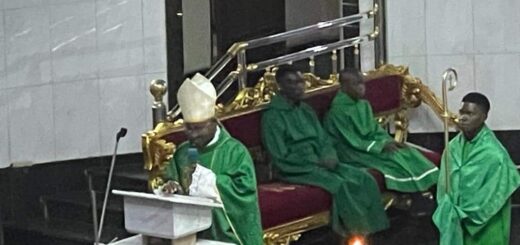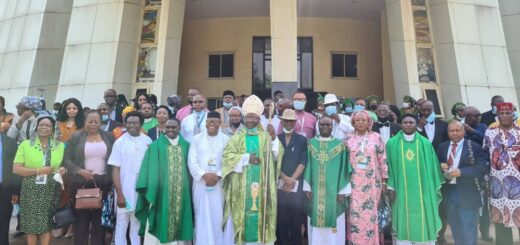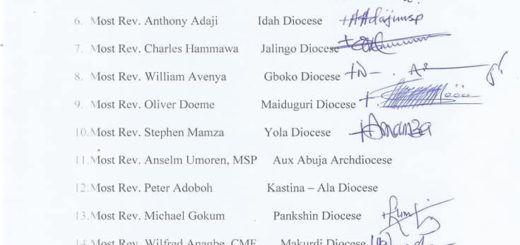Diaconate Ordination: These Deacons will be helpers
by ARCH BISHOP · January 13, 2023
Diaconate Ordination, at Christ the King Church Kubwa, Abuja, 13th January, 2023. Homily by Archbishop I.A. Kaigama
READINGS: Num. 3:5-9, 1 Tim. 3: 8-10, 12-13, Matt. 5: 13-16.
Christ the King Church Kubwa is playing host to us today as we celebrate thirteen of our brothers who will be ordained as deacons for the Archdiocese of Abuja. We thank you the priests and parishioners of this parish for your hospitality and generosity, and we thank all of you CWO, CMO, CYO, parents, seminarians, Mass servers, catechists, religious women, formators, knights and indeed, all the different laity groups attending this happy occasion.
In the first reading today, Moses was instructed by the Lord to summon the tribe of Levi and present them to Aaron the priest. They were to serve as his assistants, dutifully serving him and the entire community. This perhaps was the beginning of what would eventually be referred to as “collaborative ministry”.
In scripture we find several cases of leaders asking for help because they were unable to do all alone. Moses’ father-in -law asked him to seek help when he became overwhelmed with judging the people from morning till evening (cf. Ex18) He told Moses: “What you are doing is not good. You and these people who come to you will only wear yourselves out. The work is too heavy for you; you cannot handle it alone. Upon this advice, Moses picked his collaborators.
In Ex 17: 12-14 while praying to invoke God for victory for Israel, Moses’ arms grew tired, Aaron and Hur brought a stone for him to sit on, while they stood beside him and held up his arms, holding them steady until the sun went down. In this way Joshua totally defeated the Amalekites.
Then the Lord said to Moses, in Numbers 11:16 – 30: to choose seventy of the elders of Israel and taking some of the Spirit that was on Moses He put that Spirit on them, to help Moses bear the burden of the people, so that he would not bear the burden by himself alone.
What necessitated the choice of deacons in the New Testament was because of the complaint that arose from the Greek-speaking Jews against the Hebrews, because the Greek-speaking widows were being neglected in the daily distribution of relief materials. The Apostles entrusted to the seven the task of material distribution while they, the apostles, continued to devote themselves to prayer and to the ministry of the word. (cf. Acts 6:1-4). The apostles had prayed and they laid their hands on the chosen men (Acts 6:1-6).
The task of evangelization today is a combination of preaching Christ crucified but also the need to pay attention to people’s badly needed basic social needs, like the provision of drinkable water, food, medicine, school fees, rent, etc. This task cannot be left to the clergy or religious alone. It is part of the baptismal mandate of the baptized to go and preach as well as look out for the poor and needy. No one should sit on the fence or be anonymous, as those known as the come-to-church-and-disappear-Christians. Some go to mission physically, some go by giving, and some by praying. Try to do one of these.
We know that during COVID -19 and other difficult moments priests and religious were not left alone to minister to the needy. We had the commendable example of lay groups such as St. Vincent de Paul, the Justice, Development and Peace Commission (JDPC), San Egidio, St. Vincent de Paul, Legion of Mary, etc., who rendered great humanitarian assistance to the suffering people. This is what church society leaders should occupy themselves doing and not scrambling or competing or even fighting over positions of leadership /influence or access to money collected by members, without following the spirituality of their association.
Today we have bigger populations of the poor, the marginalized and the socially deprived are in their millions. Evangelization is no longer about mere verbal preaching the Good News. It is ironic that while the apostles spent more time preaching the word of God, we today because of increasing levels of poverty, and negligence of government at all levels, we spend more time worrying about and doing our little, looking after the poor than preaching and praying.
These deacons will be helpers of the Bishops and the priests. They can baptize, preach, do other liturgical functions except the celebration of Mass or confession. They are transitory deacons, as different from permanent deacons who are married but cannot be ordained priests. In both categories of diaconate, they must be willing to serve everywhere they are needed. Yesterday, when I had an interaction with the deacons-to-be, I asked them to imagine they were the Bishop doing this homily today at their ordination, what would they preach to themselves? They talked about availability to service wherever sent, communion/closeness to Christ and prayer. Yes, these are needed in addition to obedience, discipline, fidelity, selflessness (non attachment to material things). The deacons we have known in history like Lawrence, Stephen and others were “reputable men, filled with the Spirit and wisdom.” [Act. 6:3]. We pray that these are the qualities these new deacons will possess so that like Jesus, they will serve, but not to be served.
We thank you families of these deacons, the formators and all who have helped them in the past ten years. In the second reading, Timothy outlines the unique qualities of deacons: working diligently, not addicted to wine, not greedy, and must hold the mystery of the faithful with a clear conscience. In a society, where undue premium is placed on mundane things, and a quest for pleasure seems to dominate, you are encouraged to be of service to others, and to tame your quest for transient and ephemeral things. St. Paul warns, “Do nothing out of selfish ambition or vain conceit. Rather, in humility value others above yourselves, not looking to your own interests but each of you to the interests of the others.” (Phil 2:3-4). No wonder, one of our presidential candidates says very rightly that Nigeria is a consuming nation rather than being a producing nation. Many become so self-centred in blind pursuit of material things without conscience, and fail to put our vast material blessings to productive use for the benefit of all, especially the youths and future generations.
Part of your task as deacons is to help to offer solace and encouragement to the marginalized, the internally displaced people (IDPs), the sick, etc. To all you minister to, you must be propelled by compassion and not by selfish interests as many secular leaders do.
In today’s gospel, Jesus admonishes His disciples to be the light of the world and salt of the earth. You are challenged to influence the world positively through teaching, preaching and bringing succor to the wounded, traumatized, hungry and enfeebled Nigerians, and you should serve in the Church and in the wider society in total obedience to Christ and His teaching.
You will be handed the Book of the Gospels with these words: “Receive the Gospel of Christ, whose herald you now are.” Beware of the attitude of some pastors today watering down the gospel, preaching a Christianity without the cross; being pastors but not good Christians. Preach the word of God undiluted, pointing people to Jesus for the salvation of their souls. Do not fake miracles or adopt motivational psychology tactics to attract people, rather live an exemplary life imitating Christ. We happily look forward to the day of your priestly ordination, DV.
God bless and keep you on this journey.




